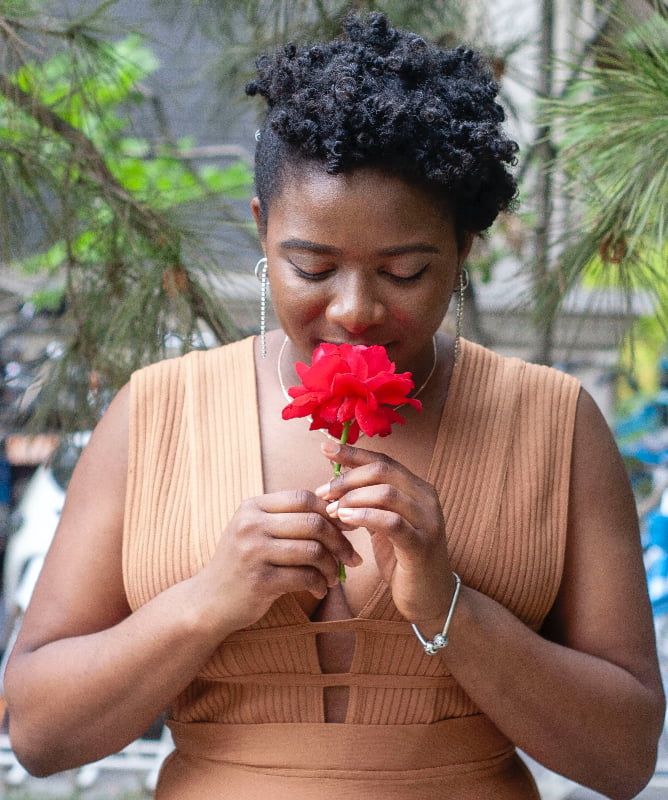Why Do Some People Fall in Love with One Another?
The process of falling in love is so complex and natural that it is difficult to study it since it is considered a subjective response inherent to human beings. Learn more about the science of love.

Have you ever wondered why when you like someone, you feel that that person is the most beautiful and amazing in the whole world? Why do your palms sweat when you see them? Or, why not all people fall in love with the same human being?
We meet many people throughout our lives, however, we tend to relate more intimately only with some, because "unintentionally" a connection is generated that, yes, may have something to do with the positive compatibility -according to the internet- between zodiac signs between you and that person, but the reasons are more complex and have to do with the psychological and biochemical processes that occur in our being.
For this, Gaceta UAEH consulted Dr. Claudia Margarita González Fragoso, full-time research professor at the Institute of Health Sciences (ICSa) of the Autonomous University of the State of Hidalgo (UAEH), to explain how our body carries out these processes and what are the factors involved in it.
Factors involved in falling in love
We have all been through the following: you are very calm or quiet and, suddenly, you see the person you like passing by a few meters away from you. Your stomach turns into the Monarch Butterfly Reserve of Michoacán because of all the fluttering you feel inside your belly, your hands start sweating, your heart beats so fast and your face turns as red as a tomato... and all this so that you don't even dare to say "hello". But how does the whole process of falling in love take place, and what are the factors involved?
"From a biological and biochemical point of view, falling in love has its origin in the cerebral cortex, continuing its journey through the endocrine system and secreting dopamine, a hormone responsible for generating changes in the hypothalamus, whose manifestation is purely physiological. In this explosive behavior called infatuation, a series of chemical factors are involved that promote it. Evolutionarily, for the perpetuation of the species, animals, both males, and females, have deployed mating and reproduction mechanisms; some biochemical aspects are thought to be common, such as smell, but in humans, this process is called love, which begins with the so-called falling in love," says Dr. González Fragoso.
Among the factors involved in the process of falling in love is the biochemical: the brain makes a whole deployment of substances, as it produces phenylethylamine, an organic compound produced by the brain belonging to the group of amphetamines, from which more dopamine is secreted, causing a state of joy, excitement, and euphoria when being with the person in love.
Another factor is evolutionary: the human being has the instinct of reproduction and continuation of the species; however, here is the difference between falling in love and love, because in love biological, psychological, and even social and cultural factors are involved.
Falling in love is a process that does not have a long duration, and it is also different in men and women; in the latter, the rate of dopamine release is slightly higher, and if it is close to the ovulation period, the release of dopamine is even higher.

The neural process by which human sexual desire becomes infatuated is the same as that in which the brain regions involved in drug addiction are activated, which is why the process of falling in love is so strong. After the emotional impulse at the beginning, the brain circuits of trust are activated to consolidate the love bond and the areas that create distance, which is activated in depressive or sad states, are specifically silenced.
"Thus, all this complex interaction of biological, cultural, and psychological mechanisms modulates the reactions and the way we experience falling in love, but not falling in love as such, since this process is, in itself, purely biochemical, but these mechanisms do influence how it is experienced," says Dr. González Fragoso.
The interaction and production of different neurotransmitters and activation of different areas of the brain produce a sensation of loss of control over thoughts and disturbing them, causing restlessness, nervousness, palpitations, anxiety, recurrent thoughts, obsession, impulsive behaviors, insomnia, loss of appetite and euphoria. The same happens with sweating hands, tachycardia, and excessive blushing of the cheeks: they are merely a physiological response caused by noradrenaline, which causes the blood pressure to rise so that, when breathing in an agitated way, more oxygen reaches the blood.
According to the expert, these are the common and frequent symptoms in people during falling in love. In other conditions, these symptoms are associated with discomfort, loss of control, and confusion, which are linked to certain psychological disorders; however, in falling in love these are not experienced as unpleasant.
However, when the infatuation ends or there has been a breakup, infidelity or the relationship is unviable, the body stops producing these substances associated with well-being, giving rise to falling out of love: the process becomes painful and a variety of behaviors are deployed to mitigate or eradicate that suffering, which can lead to maladaptive reactions such as separation anxiety, emotional dependence, change of habits, among others.

Science of love: Falling in love has four stages
The first stage is the first impression: the senses are the gateway to any external stimulus, in this case, that of sight, that is, we find a person who attracts us. Here is also involved the sense of smell, through substances that attract or repel, these are the pheromones, which are secreted through the sweat glands of the armpit and, above all, by the skin of the crotch.
All human beings have a personal scent and combination. The human being constantly receives different pheromone mixtures that go unnoticed, until the scent of the right person catches our attention, a process that we do not register rationally. This signal in the olfactory receptor generates an agitation, the source of that smell is sought and, when eye contact occurs, an electrical discharge puts the brain in a special state that awakens a set of cells in the limbic system, which in turn secrete a substance called phenylethylamine (FEA).
The second stage is that of attraction: the first neurochemical phase. Dr. Claudia Gonzalez refers that Flores (2008) describes this phase beautifully: "phenylethylamine spreads throughout the brain and there, love arises". Various brain actions are inhibited or suspended, sight, which is usually peripheral, becomes central, the thermal sensation in the skin decreases, balance and the coordination between ideas and movement slows down, and all this chaos lasts less than a second!
To regain control, the brain secretes a neurotransmitter, either dopamine or norepinephrine, which stimulates the hypothalamus, this communicates chemically with the pituitary gland, from there the communication is conducted to the thyroid, then to the pancreas, to the adrenal glands, and then, in the case of women, to the ovaries; in the case of men, to the testicles.
At the end of the chemical, communication occurs the closure of blood vessels, veins, and peripheral arteries, resulting in increased blood pressure, and with it, there is a slight increase in temperature, shivering, sweating, agitated breathing, and, therefore, sighing. With the increase in heart rate you feel a flutter in your heart, and then... you are in love! Subsequently, there is an increase of glucose in the blood, dilation of the pupil, and contraction of the stomach and intestine, which we call "butterflies in the stomach".
And yes, the "butterflies in the stomach" are also given a scientific reason. The stomach has other functions besides digesting the food we eat, it is also responsible for digesting emotions and feelings. When we are close to the person we like, we enter a state of alert (yes, as if a monster was going to attack us, "the monster of love"), and that is why the nervous system, especially the enteric nervous system, prepares itself: we release adrenaline, which causes the blood flow to concentrate in our muscles (so that we can flee in case this action is necessary) but decreases in the stomach.

The third stage is that of affection or falling in love: the chaos has just passed and the brain regains control; it levels the substances that were discharged and releases endorphins and enkephalins, natural painkillers - a real drug for the brain - which spread to tranquilize the affected organs so that the person feels tranquility, calm, joy and happiness.
The brain also has the power to control temperature and sugar variations, so the pancreas secretes insulin, glucose is metabolized and the organism calms down. After all these chemical processes, oxytocin is released, which generates the need for direct and close contact with the loved one.
The fourth stage is passion: in falling in love, the need for chemical exchange becomes greater and more uncontainable, eventually, this cycle concludes with sexual intercourse, so the erotic impulses will be more and more intense.
The adrenal glands increase testosterone production in both men and women. Men become dominant and chase away possible opponents; in women, judgment and decision-making are disturbed. The only desire is to be with the partner, increase physical contact and have sex, thus closing the love cycle.
"Infatuation is an intense emotional state; one characteristic is that it is associated with obsessive thoughts about the loved one; if the person in love is rejected, he or she usually protests and tries to get the loved one back, and may express anger at the abandonment and despair; romantic passion is involuntary, difficult to control and regularly ephemeral," says the psychology specialist, who also recognizes that infatuation involves a diverse network of erotic, cognitive, emotional and behavioral aspects.

Oxytocin is a fundamental aspect
Dr. Claudia Gonzalez also refers to the fact that, after falling in love, studies point to oxytocin as a fundamental aspect in the establishment of long-term affective bonds, as well as an increase in oxytocin levels during sexual activity, which is why it is believed that it could function as a neuromodulator of the brain activity responsible for the cognitive sensations associated with orgasm.
Thus, a satisfactory sexual life could be one of the elements that allow the establishment of affective bonds through the release of oxytocin, which gives rise to another process, which is love, which is conditioned by intervening factors such as biological, psychological, and social factors, but that, although related, is another subject.
This process (falling in love) is so complex and natural that, as the researcher states, it is difficult to study it since it is considered a subjective response inherent to human beings.
Sources:
Author: Natalia Ayerim Baltazar Flores, Gaceta UAEH
Sabater, V. (Diciembre, 2020) Las mariposas en el estómago sí existen, según la ciencia. Obtenido de https://lamenteesmaravillosa.com/las-mariposas-en-el-estomago-si-existen-segun-la-ciencia/
Secretaría de Salud (Febrero, 2013) Enamoramiento, estado emocional que se manifiesta a nivel mental y físico. Obtenido de https://www.gob.mx/salud/prensa/enamoramiento-estado-emocional-que-se-manifiesta-a-nivel-mental-y-fisico
Reporte Índigo (Febrero, 2018) ¿Qué le pasa a tu cuerpo cuando te enamoras? Obtenido de https://www.reporteindigo.com/piensa/que-le-pasa-a-tu-cuerpo-cuando-te-enamoras/
Palomo de Udaeta, M. (Febrero, 2015) ¿Por qué se me pone la piel de gallina? El País. Obtenido de https://elpais.com/elpais/2015/01/05/buenavida/1420478376_223742.html




